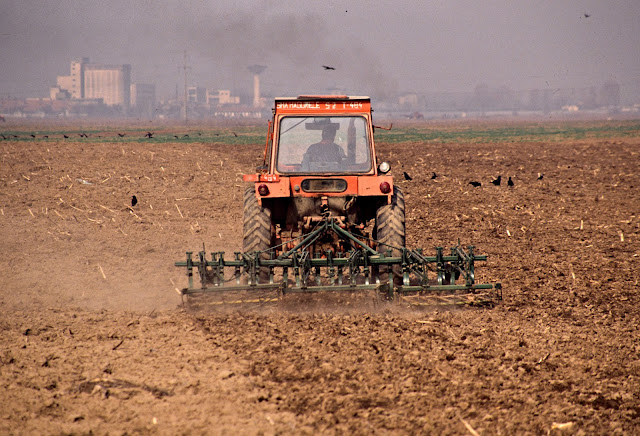 |
The Turkish fort in Timisoara was built in 1588, when
southeastern Europe
was under the dominance of Islam.
|
Sunday morning Gelu and his sister Carmen took us on another walk around Timisoara, where we saw, among other things, the old Turkish fort built in 1588. The city was under Turkish rule from 1552 until 1716, as Islam extended its territory into southeastern Europe.
Around
10 a.m. we were taken to a service at Timisoara First Church of God. After a
delicious lunch at the church, cooked and served by an immense, red-faced young
woman named Kati, we were packed into a Toyota
minivan and taken 40 miles through the rolling, northwest Romanian countryside to the
city of Arad,
where a mass city-wide rally was to be held at the municipal sports arena.
Along
our way we passed through rural villages such as Vinga, where a Roman Catholic church
towers high above the homes of peasants.
 |
A elderly peasant woman at her home in Vinga.
|
A major cultural and industrial center, Arad is the most important road and rail center in western Romania, connecting western Europe to south-eastern Europe and the Middle East.
 |
The musical groupe "Message" sings to
3,500 people in a mass rally at Arad.
|
The sports arena was jammed with about 3500 worshipers, of whom about 1000 were standing, for a service that lasted three and a half hours! The featured singers were a group called "Message," and they were seriously good. Their driving, powerful, hauntingly beautiful rendition of the hymn O the Deep, Deep Love of Jesus moved me so deeply that it became the recurring theme of the sound track of the audio-visual programs I produced from our trip.
 |
"Message" leads the crowd in "Battle Hymn of the
Republic."
|
My ears still tingle at the memory of the finale -- the packed auditorium singing in Romanian "Mine eyes have seen the glory of the coming of the Lord."
After
the rally, we went to a pastor's home, where we were served a splendid supper of
Eastern European specialties. At 10 p.m. we caught a train back to Bucharest. If we had made
the trip by air, the connection for our flight to Moscow would have been so tight
that if the plane were late we would have been stuck in Bucharest for two more days.
Apparently,
some of the Christians at Arad
had connections with the transportation officials, because we were able to get
sleeping car berths when none were supposed to be available. This was our first
experience in a sleeping car. I took the upper berth and slept well. Louse was in
the lower berth, which was a good thing because she was up and down a bit, probably as a result
of the supper we had eaten at Arad.
Arriving in Bucharest at 8:20 a.m. we hired a taxi and an interpreter to take us out of the city to photograph a communal (collective) farm. Then it was a dash back to the Church of God offices and off to the airport, where we passed through security and customs with no difficulty and on the morning of March 19, 1990, were on a plane to Moscow.
(Photographs were made with Olympus OM and Leica M cameras and lenses, Fujichrome 100D and 400D films.)




No comments:
Post a Comment